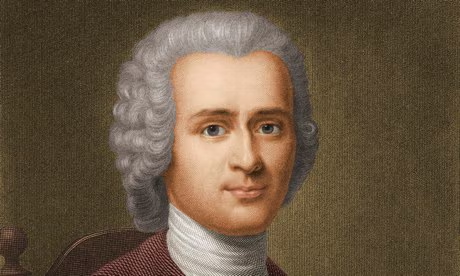Jean Jacque Rousseau was a Genevan composer, writer, and philosopher, whose ideas have influenced modern educational, economic, and political thought (Francois, 2012).
Childhood
Rousseau’s mother died during his birth and his father allowed him to grow up without much discipline or a regular education (Ergang, 1939, p. 639). He was characterized as a “literary vagabond”; someone who was wild, original, unstable emotionally, and who would fight with “almost every important person in his life, most of whom he accused of betrayal and conspiracy” (Gairdner, 1999, p. 83). Without the development of self-control as a child, he became unrestrained throughout life, something notable in both his character and his writing (Ergang, 1939).
The Social Contract
Gairdner (1999) stated that one of Rousseau’s most important books, both politically and philosophically, was The Social Contract, where he marks a shift in societal ideas around politics, the self, and the nature of reality. The first line is, arguably, a strong foundation to Romantic beliefs (Ergang, 1939): “Man is born free; and everywhere he is in chains” (Rousseau, 1950, p. 3). He explains that members of society surrender autonomy and individual freedom to those of the “general will”, that is, to civil authority (Ergang, 1939; Rousseau, 1950).
Rousseau’s Philosophy
A central theme to Rousseau’s philosophy was to return to nature, but not to return to some type of primitive state before scientific advances, but to return to before the injustice, inequality, and misery of man-made institutions and laws were introduced (Ergang, 1939). The purpose of this philosophy was to restore freedom to humans in a way that would reconcile who we truly are and how we live together within nature (Friend, n.d.). Consequently, this essay will explore Rousseau’s philosophy of returning to nature in the works of selected Romantic poets.
Equal to Nature
Robert Burns, in his poem ‘To a mouse’, explicitly references Rousseau’s philosophy of returning to nature and the negative impact of humans on nature. In the second stanza of ‘To a mouse’, the narrator states
“I’m truly sorry Man’s dominion / Has broken Nature’s social union” (Burns, n.d., para. 2).
These lines are, arguably, the most important lines in the whole poem. It is the first and only time Burns removed the Scots dialect from the poem, presenting these lines in standard English. The speaker is apologizing to a mouse, not for destroying its nest accidentally, but on behalf of humankind who treats nature so badly it “makes thee startle” and “justifies that ill opinion” (Burns, n.d., para. 2). Rousseau believed that
“all men are made by nature to be equals, therefore no one has the natural right to govern others” (Friend, n.d., para. 30).
Burns demonstrates this by exploring the relationship between the speaker and the mouse, and has the speaker acknowledge the inequality with which humankind domineers over nature.
The Domineering of Humanity
‘Auguries of innocence’ by William Blake writes from the perspective of nature to condemn the way humankind treats the nature around them. Rousseau’s ideals of returning to nature were not linked to pastoral beliefs and were more so understood to be linked to the goodness of oneself when untainted by social conventions (Gairdner, 1999).
However, the natural order of civil authority throughout society ties an individual up into socially acceptable ideals that may not align with an individual’s own beliefs and often are detrimental to the connection of nature surrounding them (Ergang, 1939). The poem uses examples of the mistreatment of animals and explicitly links them to negative consequences:
“A Robin Red breast in a Cage / Puts all Heaven in a Rage”; “A dog starvd at his Masters Gate [sic] / Predicts the ruin of the State”; “A Horse misusd upon the Road [sic] / Calls to Heaven for Human blood” (Blake, n.d.).
These lines demonstrate the speaker’s distaste for the treatment of animals and implies that the dominion over nature, through caging a bird, training a dog, or using a horse, is an unnatural order, which the “Heavens” would be angered over.
Conclusion
This essay introduced Jean Jacque Rousseau and one of his major philosophical ideas that helped shape Romanticism. It then looked at two different Romantic poems, ‘To a mouse’ by Robert Burns and ‘Auguries of innocence’ by William Blake, and discussed how they related to or drew from Rousseau’s philosophy of returning to nature.
Works Cited
Blake, W. (n.d.). Auguries of innocence. In Poetry Foundation. https://www.poetryfoundation.org/poems/43650/auguries-of-innocence
Burns, R. (n.d.). To a mouse. In Poetry Foundation. https://www.poetryfoundation.org/poems/43816/to-a-mouse-56d222ab36e33
Ergang, R. (1939). Europe from the Renaissance to Waterloo. D. C. Health and Company. https://archive.org/details/europefromtheren011542mbp/page/n13/mode/2up
Francois, J. Rousseau, Jean-Jacques. In Historical Dictionary of Switzerland. https://hls-dhs-dss.ch/fr/articles/009547/2012-05-25/
Friend, C. (n.d). Social contract theory. In Internet Encyclopedia of Philosophy. https://iep.utm.edu/soc-cont/#H2
Gairdner, W. (1999). Jean-Jacques Rousseau and the romantic roots of modern democracy. Humanitas, XII(1), 77-88. https://css.cua.edu/humanitas_journal/jean-jacques-rousseau-romantic-roots-modern-democracy/
Rousseau, J. (1950). Social contract and discourses. Dutton and Company. https://heinonline.org/HOL/P?h=hein.beal/slcttadds0001&i=57
